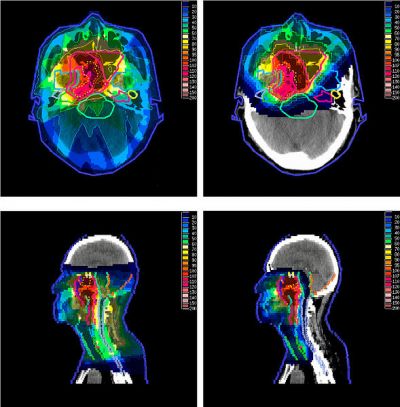The risks of low radiation doses

Comparison of dose distributions between IMPT (right) and IMRT (left), fot. By Taheri-Kadkhoda et al. Radiation Oncology 2008 34 doi10.11861748-717X-3-4 [CC BY 2.0
Cancer risk in humans exposed to low radiation doses is usually calculated based upon estimates obtained at higher doses. As many cancers originate in stem cells, studying low dose radiation effects on these cells is particularly important.
The 'Risk, stem cells and tissue kinetics – Ionising radiation' (RISK - IR) project aims to improve the knowledge of stem cell responses to low-dose ionising radiation. The project uses techniques emerging from stem cell biological research to address cancer risks.
The 5-year project is carried out by 10 institutions from 7 EU countries, with fields of expertise ranging from stem cell biology to quantitative radiation cancer risk.
During the first two years of the project, scientists addressed several questions relating to the mechanistic understanding of low-dose radiation carcinogenesis. Human and mouse haemopoietic stem cells were found to be sensitive to low doses of ionising radiation with effects observed both in the short- and long-term.
Long-term effects of low doses of radiation in the haemopoietic system were derived from repopulation studies of stem cells. By comparison, skin stem cell populations were relatively radio-resistant at low doses, and, as yet, no long-term effects on skin have been observed. Chromosomal aberrations have been observed only at higher doses, but this analysis is of limited sensitivity.
A transgenic inducible pluripotent stem cell mouse was bred to study the impact of radiation on reprogramming. Human mesenchymal stem cells showed increased senescence and reduced apoptosis following low-dose radiation exposure. Several cell lines were produced to study the underlying mechanisms in detail.
Low dose radiation-induced DNA damage responses in murine embryonic stem cells are being studied in vitro and in vivo. DNA repair, cell cycle checkpoints and cell survival are under investigation. Future work will focus on validation, extension and interpretation of these results.
Ionising radiation has many uses in industrial and medical contexts, and exposure to natural background cannot be avoided. Quantifying the risk at low radiation doses is fundamental for radiation protection. It is anticipated that RISK - IR results will add to the scientific evidence base drawn upon to inform judgements on the appropriate and acceptable balance between the risks and benefits of radiation exposure.
published: 2015-04-17

